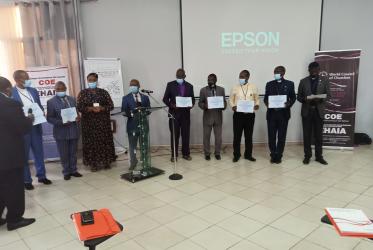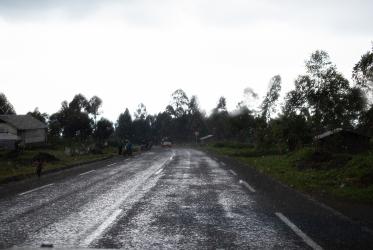Kirche Christi im Kongo - Bischöflich-Baptistische Gemeinschaft in Afrika
(Eglise du Christ au Congo - Eglise protestante baptiste en Afrique / Communauté épiscopale baptiste en Afrique, EPROBA/CEBA)
The church was founded in 1956 by Bishop Kabwe-ka-Leza and 45 other members of the Garenganze Evangelical Mission. It took the name Protestant Baptist Church in Africa in 1964. In 1976, with the "zairerization" imposed by former president Mobutu, the church, like all the other Protestant churches in Zaïre, became a member community of the Church of Christ in Congo, and was called Episcopal Baptist Community in Africa. After the democratization of the country in 1990 the church combined the two names, putting the previous one first (PBCA/EBCA). The acronym commonly used in French reads EPROBA/CEBA. The church confesses the Christian faith in the triune God and in Jesus Christ who died on the cross and rose again, for the remission of sins, according to the Apostles' Creed.
The EPROBA/CEBA has eight departments. The first one, evangelism and church life, is in charge of evangelization, healing and deliverance through prayer, edification, biblical instruction, observance of the teaching (doctrine, liturgy) and rules (discipline, conflict resolution) of the church. The department of community development is responsible for communication and information, diaconal and social services, and peace, justice and integrity of creation (including the struggle against HIV/AIDS). Other departments deal with finances, medical service, and education (32 primary and nine secondary subsidized schools, 48 primary and 40 secondary private schools); this department also looks after a Christian lay centre for young people (vocational training, language courses, etc). The Federation of Protestant and Religious Women is an important department promoting the intellectual and spiritual fulfillment of the women, their participation in the church and in society, and the development of cooperation and partnership with Christian women's organizations of other churches, in the DRC and abroad. The federation carries responsibility for several social centres and services (e.g. orphanage, sewing, literacy, ecumenical solidarity, guest-house, agricultural project, etc.). Youth United in Christ, the youth department, has activities in the areas of voluntary work, camps, sport, moral and spiritual care for boys and girls, organization of unemployed youth, etc. The Faculty of Protestant Theology of Lubumbashi is responsible for the formation of pastors and other church workers.
The ecclesiastical structure of the EPROBA/CEBA is episcopal. It has three levels: the bishop who is the president and legal representative and the assistant bishops, general vicars and vicars, pastors and their assistants. These episcopal ministries are open to any man or woman who has a divine calling, has completed the required biblical and theological formation and is accepted by the Committee for Pastoral Ministry and the governing bodies of the church. The administration of the church, the departments, services and personnel resources are coordinated by the general secretary. In all there are over 3500 employed church workers and close to 2000 volunteers.
The EPROBA/CEBA is historically concentrated in the south-eastern part of the DRC (Katanga, Kasai, Kivu). It is present in other parts of the country (Kinshasa) and in Zambia. It has a partnership with the French Reformed Church in Stockholm (Sweden) and the Evangelical Church in Werheim (Germany).
Last updated:01/01/06




